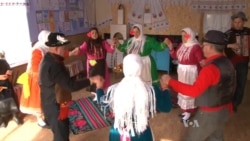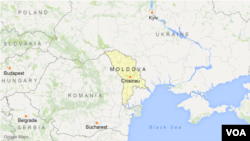Outside the government building in Comrat, the capital of Gagauzia, a group of gardeners takes care of plants in a small plot next to a statue of Russia’s communist revolutionary, Vladimir Lenin.
Across the street is a Turkish library named after Mustafa Kemal Ataturk.
The statue and the library together point to the dilemma faced by the Gagauzians, a Turkic and Russian-speaking minority in an autonomous region of about 160,000 people in Southern Moldova.
Russia's fall-out with Turkey over the downing of a Russian warplane and the two countries' support for opposing sides in the Syrian conflict has sparked fears of a wider conflict and repercussions among peoples with close ties to both countries.
Caught in the middle
Just outside Comrat, in the town of Besalma, an ensemble of retired men and women dance in a circle holding hands.
Dressed in traditional village clothes, they demonstrate Gagauzian dances and songs for visiting guests while a younger man plays an accordian.
At the town’s historic ethnographic museum, Director Ludmila Marin shows displays of photographs and documents outlining the Gagauzians' Turkic origin. "Our nation historically was for a long time a Turkic nation,” she says, “but destiny put us on the territory of Russia.”
In another room, the museum displays Soviet weapons used during World War Two. Since the breakup of the Soviet Union, the region has leaned to Russia.
Russia's and Turkey's worsening relations over Syria have caught the Gagauzians in the middle, says the governor of Gagauzia, Irina Vlah, in an exclusive interview with VOA. "Today it is very hard for us to express an official position on this conflict,” she says, “because we continue to keep these relationships.”
Courted by Moscow, balancing the EU
Gagauzia was given broad autonomy to remain part of Moldova, but recent corruption scandals and Russian state media fuel skepticism of Moldova's European orientation.
“We are part of the Turkic-speaking nations,” said Comrat resident Nina Balava. “But we are drawn to Russia because Russia lives inside of us.”
Moscow banned imports of wine from Moldova for its moves toward the European Union, but allowed Gagauzian imports.
On a shelf in Governor Vlah’s office is a photo of her with Valentina Matviyenko. The speaker of Russia’s upper house of parliament is an ardent nationalist who is under western sanctions for her role in Russia’s annexation of Crimea.
Vlah says despite their leanings to Russia, the Gagauzians are trying to balance relations with EU states as well. “We constantly tell the Moldovan government that we need to have good relationships with Russia as well as partners from the European Union, and other partners,” she said.
She said that in addition to Russian investors, they are trying to attract German and Turkish companies as well.
Referring to recent corruption scandals among pro-Europe Moldovan politicians, Governor Vlah said if their behavior matched their rhetoric on European values, Gagauzians would have fewer doubts about Moldova's European path.






